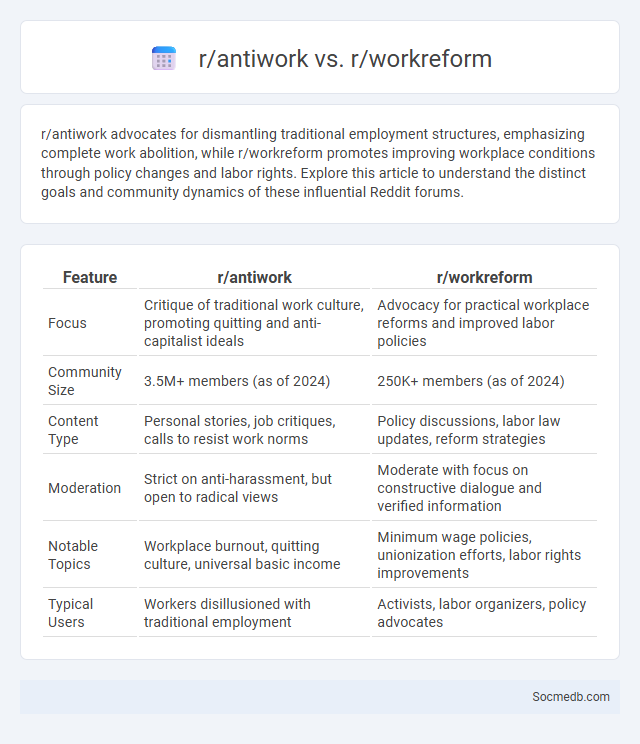
Photo illustration: r/antiwork vs r/workreform
r/antiwork advocates for dismantling traditional employment structures, emphasizing complete work abolition, while r/workreform promotes improving workplace conditions through policy changes and labor rights. Explore this article to understand the distinct goals and community dynamics of these influential Reddit forums.
Table of Comparison
| Feature | r/antiwork | r/workreform |
|---|---|---|
| Focus | Critique of traditional work culture, promoting quitting and anti-capitalist ideals | Advocacy for practical workplace reforms and improved labor policies |
| Community Size | 3.5M+ members (as of 2024) | 250K+ members (as of 2024) |
| Content Type | Personal stories, job critiques, calls to resist work norms | Policy discussions, labor law updates, reform strategies |
| Moderation | Strict on anti-harassment, but open to radical views | Moderate with focus on constructive dialogue and verified information |
| Notable Topics | Workplace burnout, quitting culture, universal basic income | Minimum wage policies, unionization efforts, labor rights improvements |
| Typical Users | Workers disillusioned with traditional employment | Activists, labor organizers, policy advocates |
Introduction to r/antiwork, r/workreform, and Related Subreddits
Reddit hosts key communities like r/antiwork and r/workreform that focus on critiquing the traditional labor system and advocating for fairer work conditions. r/antiwork primarily challenges the necessity of conventional employment structures, while r/workreform seeks practical solutions to improve workplace policies and labor rights. You can explore related subreddits such as r/labor and r/workplace to stay informed about ongoing discussions on employment reform and worker empowerment.
Origins and Purpose of r/antiwork
The r/antiwork subreddit originated in 2013 as a community for discussions surrounding labor rights, workplace dissatisfaction, and critiques of capitalist work culture. Its purpose revolves around advocating for workers' rights, questioning traditional work ethics, and promoting ideas such as reduced work hours, fair wages, and workplace autonomy. The subreddit gained significant attention during the COVID-19 pandemic, reflecting growing public interest in labor reform and anti-exploitation movements.
The Mission and Values of r/workreform
r/workreform promotes equitable labor policies by advocating for fair wages, improved workplace conditions, and employee rights protections. The community values transparency, inclusivity, and collective action to drive systemic change in employment practices. Its mission centers on empowering workers through shared knowledge and coordinated reform efforts.
Key Differences Between r/antiwork and r/workreform
The key differences between r/antiwork and r/workreform lie in their core missions and discourse approaches; r/antiwork advocates for the abolition of traditional work structures and challenges the capitalist labor system, while r/workreform pushes for pragmatic changes within existing labor frameworks, such as fair wages, improved conditions, and labor rights reforms. Your engagement with these subreddits will reveal r/antiwork's more radical critiques of work culture versus r/workreform's focus on incremental policy improvements and workplace democracy. Both communities highlight labor issues but cater to distinctly different audiences and goals related to workers' rights and economic justice.
Shared Goals and Overlapping Discussions
Social media platforms often foster shared goals among users, enabling communities to collaborate on causes such as environmental sustainability, social justice, or brand advocacy. Overlapping discussions emerge as diverse groups converge on common topics, enriching the conversation with varied perspectives and driving collective problem-solving. Your engagement in these dynamic networks can amplify your voice and connect you with others who prioritize similar objectives.
Demographics and Community Culture
Social media platforms attract diverse demographics, with younger users dominating Instagram and TikTok, while Facebook appeals more to older age groups. Community culture varies significantly across platforms, from the fast-paced, trend-driven environment on Twitter to niche interest groups on Reddit. Understanding these demographic and cultural distinctions helps you tailor content effectively to engage your target audience.
Viral Moments and Online Impact
Viral moments on social media platforms like TikTok, Instagram, and Twitter generate exponential engagement, rapidly amplifying brand visibility and user interactions. These spikes in online activity create significant cultural impact, influencing trends, consumer behavior, and even political discourse across global digital communities. The measurable online impact often translates into increased website traffic, sales conversions, and heightened relevance in competitive markets.
Criticism and Controversies
Social media platforms face criticism for spreading misinformation, compromising user privacy, and enabling online harassment. Algorithms often prioritize sensational content, which can fuel polarization and echo chambers, impacting public discourse negatively. Your experience on social media may be affected by these controversies, highlighting the need for critical media literacy and cautious engagement.
Influence on Workplace Discourse and Real-Life Activism
Social media dramatically shapes workplace discourse by enabling rapid information exchange and fostering diverse perspectives in professional settings. Your online interactions can amplify real-life activism, mobilizing collective action and raising awareness on social issues. This digital influence transforms both communication dynamics and societal engagement beyond the virtual realm.
The Future of Work-Related Subreddits
Social media platforms, especially work-related subreddits like r/futurology and r/remote work, are becoming vital hubs for professionals to discuss emerging trends and tools shaping the future of work. These communities provide real-time insights into automation, remote collaboration, and AI-driven job markets, helping you stay ahead in an evolving career landscape. Engaging with such content empowers your understanding of workforce transformations and prepares you for upcoming industry shifts.
 socmedb.com
socmedb.com